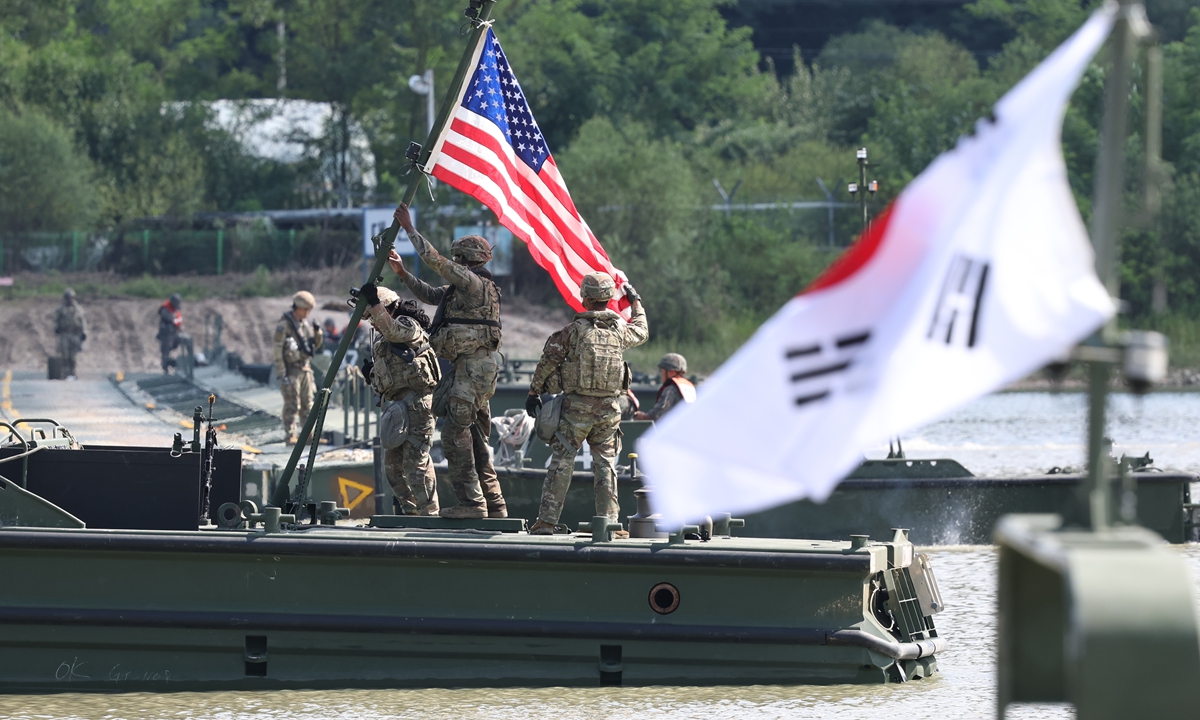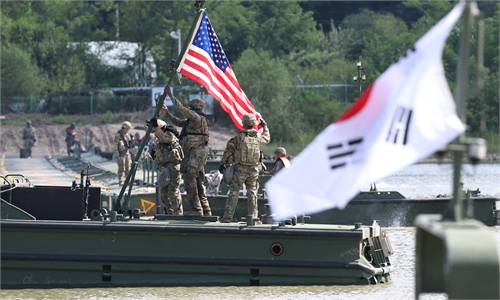
The US and South Korea joint military drill on August 31, 2023. Photo: IC
Warships from the US, South Korea and Canada drilled on September 14 in the Yellow Sea, one day before the three countries steamed for Incheon to help reenact an amphibious landing during the 1950-53 Korean War, Stars and Stripes reported on September 15. This is the first large-scale exercises that the US navy participated in the Yellow Sea off the coast of northern China in 10 years.The US is changing its 10-year low-key manner in the Yellow Sea, demonstrating that it is integrating all the forces it can use in the Northeast Asia region, the East China Sea, the Taiwan Straits and the South China Sea into a unified chain to contain China under its framework of Indo-Pacific Strategy.
The US and its allies have been quite proactive around China's surrounding waters lately. Through multiple joint military exercises, the US is further escalating tensions in China's surrounding areas. They often claimed the events were carried out under the name of responding to continuing tension with North Korea, but the trilateral leaders' summit at Camp David among the US, South Korea and Japan in late August has already made it clear that Northeast Asia is an important part of US Indo-Pacific Strategy to contain China. The US, Japan and South Korea are moving closer to forming a trilateral alliance and further accelerating NATO-ization of the region. The gates of hell have been opened.
Since President Joe Biden took office, the US has been deepening its Indo-Pacific Strategy in Northeast Asia, strengthening the trilateral relationship among the US, Japan and South Korea, and the regional dynamics in Northeast Asia have been undergoing rapid changes. The most important trend against the backdrop is the emergence of camp politics in Northeast Asia. Confrontation and antagonism between North and South Korea has deepened. Ties between North and South Korea become increasingly tense. And it is growingly difficult to restart dialogue between Washington and Pyongyang. Mutual hostility is intensifying.
Veteran US diplomat Henry Kissinger famously stated, "To be an enemy of America can be dangerous, but to be a friend is fatal." Traditional US political and diplomatic elites repeatedly advocate that the most important foundation of US global hegemony is the alliance system, yet in reality, there have often been scenarios in US diplomatic history where the interests of allies are disregarded in favor of Washington's own interests. This shows that the alliance system only serves to maximize US' own interests.
Since South Korean President Yoon Suk-yeol took office, deepening the US-South Korea alliance has become the cornerstone of his foreign policy, indicating that South Korea is fully swinging to the US. Under the joint influence of the Biden and Yoon administrations, the US-South Korea alliance has been deeply integrated into the US Indo-Pacific Strategy. The US has gradually made South Korea accept the perception that "China is a threat" through a series of means, incorporating US global interests into South Korea's national interests. South Korea has thus shifted from striking partial "balance" to becoming a complete follower.
Faced with low approval ratings, the Yoon administration has hyped up a pro-US, anti-China, anti-North Korea atmosphere at home. It has done in the hope of rallying the public through inciting national sentiment or creating external friction to boost public support and lift ratings. This is dangerous and will jeopardize the stability in the Northeast region.
As can be seen, with the US intensifying the implementation of the Indo-Pacific Strategy and the strengthening of the trilateral relationship among the US, Japan and South Korea, the camp politics in Northeast Asia is becoming increasingly obvious. It should be said that the current stage is an extremely severe period for the security situation in Northeast Asia since the end of the Cold War. However, despite the continuous fermentation and accumulation of negative factors, the overall situation in Northeast Asia is still controllable, and the possibility of a serious conflict breaking out in the short term is not high. The most important thing is that China has always been an important force in maintaining peace and stability in the region.
The author is a research fellow at the Institute of American Studies, Chinese Academy of Social Sciences. opinion@globaltimes.com.cn

